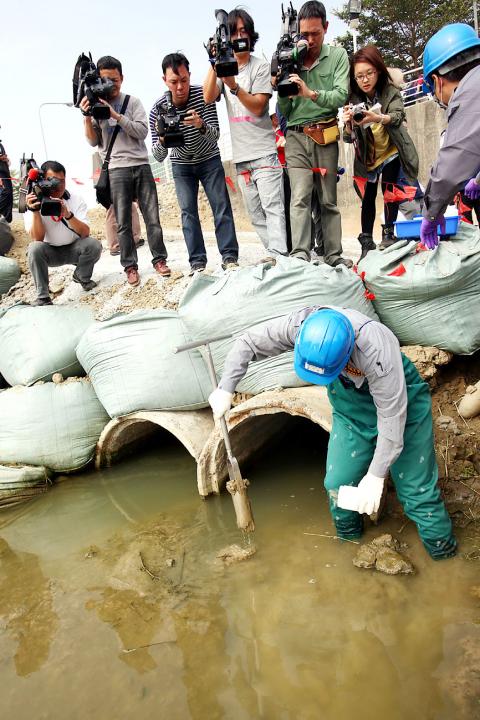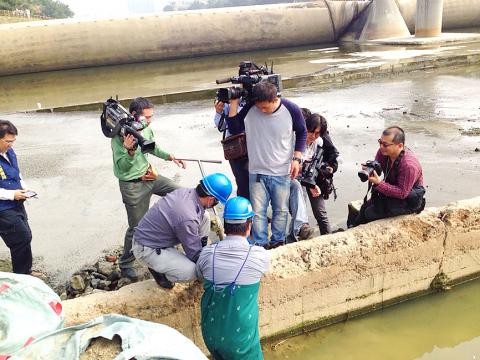Advanced Semiconductor Engineering Inc (ASE, 日月光半導體), the world’s biggest chip packager, yesterday apologized for a leak of toxic wastewater from its biggest plant in Grater Kaohsiung, and said it was undertaking steps to contain the damage.
The company held a press conference yesterday afternoon after one of its factories, known as K7, was fined NT$600,000 (US$20,300) and ordered to suspend operations for contravening the Water Pollution Control Act (水污染防治法).
Greater Kaohsiung’s Environmental Protection Bureau said its investigators found high levels of acidity and nickel in samples of water taken from the factory’s discharge pool and from the Houjin River (後勁溪), into which it empties.

Photo: Chang Chung-i, Taipei Times
Water from the river is used to irrigate hundreds of hectares of paddy fields.
Bureau officials said highly acidic waste water with a pH of 3.02 was discovered being discharged under the Demin Bridge (德明橋) during a water quality inspection along the river on Oct. 1, and the source of the pollution was traced back to ASE’s K7 plant.
Water in the wastewater storage tank in the plant’s basement, which is connected to pipes that discharge the water into the river, was tested and found to exceed all standard levels with a pH of 2.63, 96mg/L suspended solids level, 135mg/L chemical oxygen demand level and 4.38mg/L nickel level.

Photo: CNA
The K7 plant discharges wastewater 24 hours a day, making it the ninth-biggest discharger in the city, and the level of nickel in discharged water was about the same as the wastewater found in the plant, indicating the plant was not treating the water before discharging it, the bureau said.
Bureau Director-General Derek Chen (陳金德) on Monday said that the plant’s management showed malicious intent by trying to use tap water to dilute the highly acid wastewater when the inspectors arrived to conduct tests. Since ASE was fined three times for the same violation last year, the bureau decided to impose the stiffest fine possible and order a halt to the plant’s operations.
The company operates 17 plants in Greater Kaohsiung.
ASE officials told reporters yesterday that employees had been punished for failing to notify the environmental bureau about a hydrochloric acid leak when it occurred on Oct. 1.
To prevent a reoccurrence, ASE chief operating officer Tien Wu (吳田玉) said the firm would step up its monitoring mechanisms and review all of its wastewater treatment facilities.
“It was a one-time incident,” Wu said. “We have adjusted the piping system to avoid releasing the wastewater directly into the wastewater barrels.”
However, ASE officials said the company had not received the suspension order from the bureau, so K7 was continuing to operate.
ASE counts contract chipmaker Taiwan Semiconductor Manufacturing Co (TSMC, 台積電) and mobile phone chip supplier MediaTek Inc (聯發科) among its major clients.
The K7 plant, which is ASE’s largest wafer bumping facility for smartphone chips, accounted for 10 percent of ASE’s overall revenue, Credit Suisse analyst Randy Abrams said in a note yesterday.
“Impact on customers and sales should be limited,” Abrams said, adding that ASE needed to respond quickly to restore its reputation.

SECURITY: As China is ‘reshaping’ Hong Kong’s population, Taiwan must raise the eligibility threshold for applications from Hong Kongers, Chiu Chui-cheng said When Hong Kong and Macau citizens apply for residency in Taiwan, it would be under a new category that includes a “national security observation period,” Mainland Affairs Council (MAC) Minister Chiu Chui-cheng (邱垂正) said yesterday. President William Lai (賴清德) on March 13 announced 17 strategies to counter China’s aggression toward Taiwan, including incorporating national security considerations into the review process for residency applications from Hong Kong and Macau citizens. The situation in Hong Kong is constantly changing, Chiu said to media yesterday on the sidelines of the Taipei Technology Run hosted by the Taipei Neihu Technology Park Development Association. With

CARROT AND STICK: While unrelenting in its military threats, China attracted nearly 40,000 Taiwanese to over 400 business events last year Nearly 40,000 Taiwanese last year joined industry events in China, such as conferences and trade fairs, supported by the Chinese government, a study showed yesterday, as Beijing ramps up a charm offensive toward Taipei alongside military pressure. China has long taken a carrot-and-stick approach to Taiwan, threatening it with the prospect of military action while reaching out to those it believes are amenable to Beijing’s point of view. Taiwanese security officials are wary of what they see as Beijing’s influence campaigns to sway public opinion after Taipei and Beijing gradually resumed travel links halted by the COVID-19 pandemic, but the scale of

A US Marine Corps regiment equipped with Naval Strike Missiles (NSM) is set to participate in the upcoming Balikatan 25 exercise in the Luzon Strait, marking the system’s first-ever deployment in the Philippines. US and Philippine officials have separately confirmed that the Navy Marine Expeditionary Ship Interdiction System (NMESIS) — the mobile launch platform for the Naval Strike Missile — would take part in the joint exercise. The missiles are being deployed to “a strategic first island chain chokepoint” in the waters between Taiwan proper and the Philippines, US-based Naval News reported. “The Luzon Strait and Bashi Channel represent a critical access

Pope Francis is be laid to rest on Saturday after lying in state for three days in St Peter’s Basilica, where the faithful are expected to flock to pay their respects to history’s first Latin American pontiff. The cardinals met yesterday in the Vatican’s synod hall to chart the next steps before a conclave begins to choose Francis’ successor, as condolences poured in from around the world. According to current norms, the conclave must begin between May 5 and 10. The cardinals set the funeral for Saturday at 10am in St Peter’s Square, to be celebrated by the dean of the College